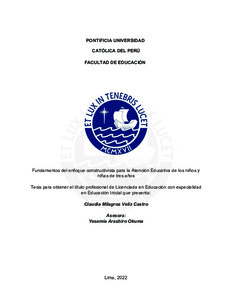| dc.contributor.advisor | Arashiro Okuma, Yesemia | |
| dc.contributor.author | Veliz Castro, Claudia Milagros | |
| dc.date.accessioned | 2022-07-13T20:05:59Z | |
| dc.date.available | 2022-07-13T20:05:59Z | |
| dc.date.created | 2022 | |
| dc.date.issued | 2022-07-13 | |
| dc.identifier.uri | http://hdl.handle.net/20.500.12404/22797 | |
| dc.description.abstract | Según la Organización de las Naciones Unidas para la Educación, la Ciencia y la Cultura
(UNESCO, 2021) la atención educativa temprana es el cimiento de la Educación Básica.
Asimismo, el Programa Curricular Educación Inicial (2017) Señala que es imprescindible
desarrollar el potencial cognitivo, afectivo, social y moral respetando la individualidad de
cada niño y niña. En ese sentido, el constructivismo es pertinente porque considera la
etapa evolutiva de desarrollo, fomenta la construcción del conocimiento a partir de
experiencias previas e interacción con el contexto sociocultural. El presente estudio,
plantea la siguiente interrogante: ¿Cuáles son los fundamentos desde el enfoque
constructivista para brindar atención educativa a los niños de tres años para su desarrollo
integral? Busca explicar los fundamentos del enfoque constructivista en la atención
educativa para el desarrollo integral en los niños y niñas de tres años. La metodología
de la investigación es el método documental, de enfoque cualitativo, de tipo descriptivo.
Para la organización de la información se utiliza la matriz de análisis individual de fuentes
y la matriz de análisis temático. Las conclusiones a las que se llega es que los principios
del constructivismo se fundamentan en el aprendizaje como proceso activo, secuenciado
de internalización que se construye individualmente en la interacción social. En
consecuencia, este enfoque promueve la generación de conocimiento en los niños y
niñas de la etapa preoperacional para el desarrollo integral. | es_ES |
| dc.description.abstract | According to the United Nations Educational, Scientific and Cultural Organization
(UNESCO, 2021), early educational care is the foundation of Basic Education. Likewise,
the Initial Education Curricular Program (2017) makes it essential to develop the
cognitive, affective, social and moral potential, respecting the individuality of each boy
and girl. In this sense, constructivism is pertinent because it considers the evolutionary
stage of development, fosters the construction of knowledge through an intense mental
activity of the student based on previous experiences and interaction with the
sociocultural context. This study raises the following question: What are the foundations
from the constructivist approach to provide educational care to three-year-old children for
their comprehensive development? It seeks to explain the fundamentals of the
constructivist approach in educational attention for the integral development of threeyear-
old boys and girls. The research methodology is the documentary method,
qualitative approach, descriptive type. For the organization of the information, the matrix
of individual analysis of sources and the matrix of thematic analysis according to the
chapters are used. The conclusions reached is that the principles of constructivism are
based on learning as an active, sequenced process of internalization that is built
individually in social interaction. Consequently, this approach promotes the generation of
knowledge in children of the preoperational stage for comprehensive development. | es_ES |
| dc.language.iso | spa | es_ES |
| dc.publisher | Pontificia Universidad Católica del Perú | es_ES |
| dc.rights | info:eu-repo/semantics/openAccess | es_ES |
| dc.rights.uri | http://creativecommons.org/licenses/by-sa/2.5/pe/ | * |
| dc.subject | Constructivismo (Educación) | es_ES |
| dc.subject | Desarrollo infantil | es_ES |
| dc.subject | Atención en niños | es_ES |
| dc.subject | Educación preescolar--Investigaciones | es_ES |
| dc.title | Fundamentos del enfoque constructivista para la Atención Educativa de los niños y niñas de tres años | es_ES |
| dc.type | info:eu-repo/semantics/bachelorThesis | es_ES |
| thesis.degree.name | Licenciado en Educación con especialidad en Educación Inicial | es_ES |
| thesis.degree.level | Título Profesional | es_ES |
| thesis.degree.grantor | Pontificia Universidad Católica del Perú, Facultad de Educación | es_ES |
| thesis.degree.discipline | Educación con especialidad en Educación Inicial | es_ES |
| renati.advisor.dni | 06894426 | |
| renati.advisor.orcid | https://orcid.org/0000-0002-4383-0907 | es_ES |
| renati.author.dni | 41077152 | |
| renati.discipline | 111016 | es_ES |
| renati.juror | Arashiro Okuma, Yesemia | es_ES |
| renati.juror | Nakamura Goshima, Patricia Eileen | es_ES |
| renati.juror | Vargas D'uniam, Clara Jessica | es_ES |
| renati.level | https://purl.org/pe-repo/renati/level#tituloProfesional | es_ES |
| renati.type | https://purl.org/pe-repo/renati/type#tesis | es_ES |
| dc.publisher.country | PE | es_ES |
| dc.subject.ocde | https://purl.org/pe-repo/ocde/ford#5.03.01 | es_ES |






